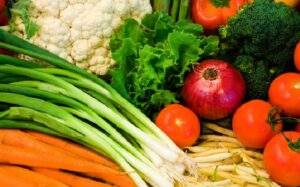
Health Benefits of Fruits and Vegetables
A diet rich in fruits and vegetables can help you control your weight, lower blood pressure, reduce the risk of heart disease and some cancers. They are also low in saturated fat, salt and sugar.
Food neophobia (fear of new foods) peaks in children between two and six years old. This can make it difficult for them to eat the recommended servings of fruit and vegetables every day.
1. They are good for your heart
The new food plate unveiled by the government sends a clear message: Eat more fruits and vegetables. This is good news for anyone who struggles to get enough produce in their diet, but especially those with heart disease or high blood cholesterol.
The heart-healthy nutrients in veggies and fruit are powerful weapons against serious illnesses. Getting more of them can lower your risk for stroke, high blood pressure and cancer. They also contain soluble fiber, which may help lower LDL (“bad”) cholesterol. They also provide folate, potassium and vitamin A and C.
A recent study published in the International Journal of Epidemiology found that people who ate about five servings of veggies and fruit per day had a 16% lower risk of death from cardiovascular disease than those who ate less. (4)
To get more fruits and veggies in your diet, try to choose different ones each time you go grocery shopping and stock up on both fresh and frozen. You can add a variety of fruit to smoothies, mix berries into pancakes and muffin batter, or stir sliced up vegetables like spinach or kale into soups and curries.
2. They are good for your eyes
The eye health benefits of fruits and vegetables are largely due to vitamins and minerals that they contain. Vitamin A, found in many orange-colored foods like carrots and sweet potatoes, is a crucial nutrient for healthy eyes. It protects the surface of your eyes and helps the body absorb and process light. Berries like strawberries, cranberries and blackberries are also rich in vitamin A and are an important addition to any healthy diet. They are also high in potassium, which reduces dry eye symptoms and improves the overall functioning of your eyes.
Leafy green vegetables, such as kale, spinach and Swiss chard, are rich in both lutein and zeaxanthin, which help prevent age-related macular degeneration. They also contain a host of other nutrients that make them good for your eyes, including beta-carotene, vitamin C and zinc.
Citrus fruits, such as oranges and grapefruits, are rich in vitamin C, which supports the health of your eye’s blood vessels. They are also an excellent source of antioxidants that can help prevent macular degeneration and lower your risk of developing cataracts.
3. They are good for your digestive system
Eating plenty of fruits and vegetables helps keep your digestive system healthy, which in turn reduces your risk of constipation and other digestion problems. They also help your body maintain a normal weight and lower your risk of chronic diseases like Type 2 diabetes and heart disease.
The best way to get the most benefit from your fruit and vegetables is to eat a variety of different kinds every day. This ensures you’re getting a mix of nutrients and plant chemicals.
It’s also important to choose fresh, unprocessed fruits and vegetables whenever possible, as these contain more health-boosting nutrients than processed foods. Try to stick with the Australian dietary guidelines, which recommend eating at least five portions of different types of vegetables and fruit each day. One portion is roughly 80g – for example, half a grapefruit or two satsumas.
Be sure to avoid choosing foods that are high in fat or sugar, as these can cause digestive upset. And try to eat meals at the table, rather than in front of a TV – studies have shown that people who eat while watching television tend to consume more discretionary foods and fewer foods from the recommended groups.
4. They are good for your skin
A balanced diet rich in fruits and vegetables contains many vitamins and minerals that are beneficial to the health of your skin. Vitamin C, for example, is a powerful antioxidant that helps to protect the skin from UV damage and reduces the appearance of wrinkles. Other skin-supporting nutrients in fruits and vegetables include dietary fiber, potassium and beta carotene.
Add a variety of fruits and vegetables to your diet to get a mix of different plant chemicals. Leafy greens provide chlorophyll, which supports detoxification and skin health, while orange and yellow foods contain beta carotene, which promotes a healthy, sun-kissed glow. Blue and purple fruits are packed with anthocyanins, which reduce inflammation and support collagen production.
Strawberries are a rich source of vitamin C and have natural skin-soothing properties. They are also a good source of ellagic acid, which reduces inflammation and oxidative stress. Try adding them to your breakfast or smoothies. Avocados are high in vitamin A, K, and C, folate and fatty acids that can improve skin elasticity and hydration. Mash them up and apply it to the face for 30 minutes, before rinsing off.
5. They are good for your bones
A diet rich in fruits and vegetables provides essential micronutrients that help strengthen bones. This includes calcium, magnesium, potassium and vitamins C and K. These nutrients help prevent osteoporosis, a disease that weakens bones. Regular fruit consumption also helps balance the acidity of the blood, which may protect against bone loss and lower your risk of a fracture.
In addition, cruciferous veggies like kale contain sulforaphane, which supports healthy bone density by blocking the synthesis of certain enzymes that break down bones. Kale is also high in calcium, magnesium, vitamin A and vitamin K, as well as other antioxidants.
Aim to eat at least five servings (400g) of a variety of fresh, frozen and canned fruit and vegetables a day. Try to mix it up and include different colours to get a range of phytochemicals and nutrients. Remember that dried fruit counts as a portion too, but only occasionally. A 30g serve is roughly the size of two satsumas or three dried apricot halves. If eating dried fruit, make sure it isn’t eaten before meals to avoid tooth decay.


